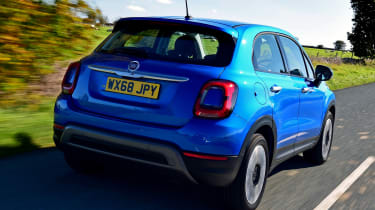Fiat 500X SUV - Engines, drive & performance
The Fiat 500X offers a good balance of strong performance and wallet-friendly running costs
The Fiat 500X shares its DNA with the Jeep Renegade, so offers a decent breadth of talent on and off road, but if the driving experience is high on your agenda, you need to choose your engine carefully.
What's pretty much a given in all versions of the 500X is that it handles well for a high-riding crossover, with controlled body lean in corners and sharp steering, although there's precious little feel or feedback from the latter. The ride quality, although firm, is generally comfortable, but the larger alloy wheels on higher-spec models rather highlight potholes and road surface imperfections, resulting in a jiggly ride. There are a few changes for the Sport trim, sharpening up the steering and lowering its ride height by 13mm.
Fiat 500X petrol engines
The 118bhp 1.0-litre turbocharged three-cylinder petrol engine is far better than the old 1.6-litre engine – in fact, it's our pick of the range. It still isn’t fast, with a 0-62mph time of 10.9 seconds, but acceleration feels lively and it’s powerful enough to make cruising at motorway speeds relaxing. Sadly, its six-speed manual gearbox lets the side down a little, with a ponderously long travel between the front and back rows of gears, and a slow, imprecise action.
The more powerful 148bhp 1.3-litre turbocharged petrol engine provides nippier performance, but is now only available as a used model. It came as standard with a slightly reluctant six-speed automatic gearbox, and its steering wheel paddles aren’t the most usable.
Its successor, a 1.5-litre mild-hybrid petrol engine, has a seven-speed automatic gearbox but it’s still a little lethargic and slow to respond. We’d like it to kick down a gear a bit sooner when you press the accelerator hard, and it doesn’t feel quite as sprightly as its 9.4-second 0-62mph time suggests.
The 48-volt hybrid system enables the engine to start on electric power; it can also creep in slow-moving traffic jams and park without using any fuel, plus it helps get the engine up to temperature quicker and reduce turbo lag. However, we’re not convinced that you should pay £4,000 more for the mild-hybrid engine than for an equivalent car with a 1.0-litre petrol engine.













